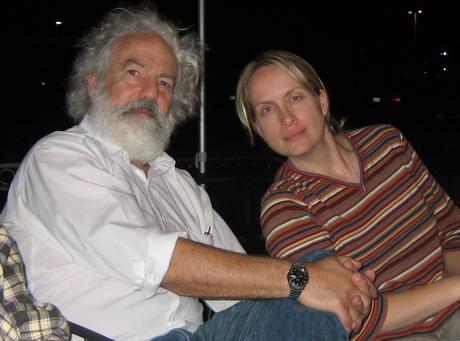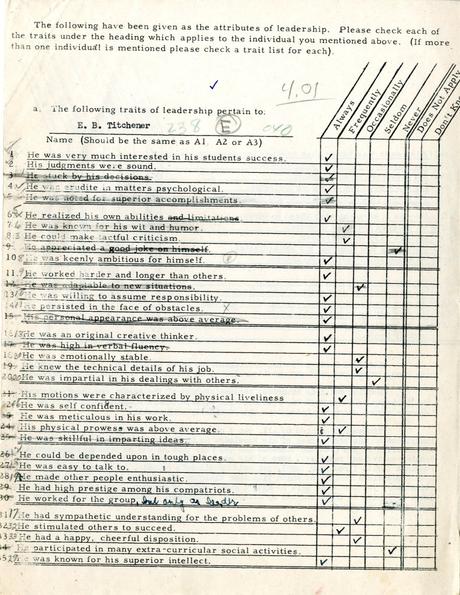~ contributed by Jodi Kearns.
In the early 1950s, Lauren G. Wispé set out to study social and psychological factors associated with eminence in the field of psychology by analyzing selected psychologists’ responses to a 12-page questionnaire asking about family, early education, and socioeconomic backgrounds. If you want to read Wispé’s results, have a look at Traits of Eminent American Psychologists published in Science in 1963.
The Cummings Center has a small collection of the returned questionnaires, which have some coding marks from the data analysis, and no additional research materials. In a previous blog, we pulled excerpts from the Wispé survey question, Have there been any handicaps or factors which have interferred [sic] with your career?
Some other questions ask about parents’ ages at the psychologist’s birth, parents’ professions, and family members’ achieved levels of education. Questions cover work experience, mentors and influences, promising students, and prominent research and publications. The collection is a trove of eminent psychologist autobiography and self-awareness.
For National Mentoring Month, these excerpts focus on survey questions about leaders on faculties, field influences, and outstanding students.
Abraham Maslow, for example, wrote Harry Harlow in several places in his responses to questions about faculty leaders when he was a grad student.
 Abraham Maslow’s responses to: Name of man (men) who supervised your dissertation
Abraham Maslow’s responses to: Name of man (men) who supervised your dissertation Abraham Maslow’s responses to: Name some of the outstanding Leaders on the faculty while you were [in graduate school]
Abraham Maslow’s responses to: Name some of the outstanding Leaders on the faculty while you were [in graduate school] Abraham Maslow’s responses to: As a student I was stimulated by
Abraham Maslow’s responses to: As a student I was stimulated byThough, Harry Harlow did not name Maslow as one of his outstanding students. Ope.
 Harry Harlow’s responses to: Names of outstanding students who have worked with you
Harry Harlow’s responses to: Names of outstanding students who have worked with youTo add another branch to this genealogy of academic mentorship, Walter Miles lists Harry Harlow as an outstanding student, making Miles Maslow’s academic grandparent.
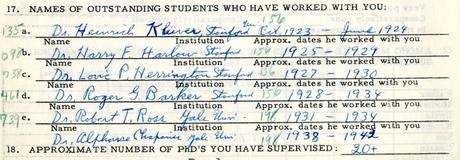 Walter Miles’ responses to: Name of outstanding students who have worked for you
Walter Miles’ responses to: Name of outstanding students who have worked for youGordon Allport couldn’t wrap his head around the limitations of the survey and just could not bring himself to write down his influences because there were too many variables.
 Gordon Allport’s response to: As a student I was most stimulated by
Gordon Allport’s response to: As a student I was most stimulated byAnd Frank Beach hadn’t had any outstanding students in his first five years of practice.
 Frank Beach’s response to: Names of outstanding students who have worked with you
Frank Beach’s response to: Names of outstanding students who have worked with youMax Wertheimer‘s list of outstanding students looks like a Who’s Who of CCHP content.
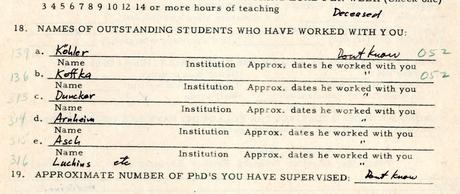 Max Wertheimer’s responses to: Names of outstanding students who have worked with you
Max Wertheimer’s responses to: Names of outstanding students who have worked with youKöhler, Koffka, Duncker, Arnheim, Asch, Luchins
There are more than a hundred survey responses listing influences, mentors, and promising students in this collection, and my personal favorite is pulled from E. G. Boring‘s questionnaire responses.
Who chaired Boring’s dissertation? E. B. Titchener.

Who were the leaders on faculty at Boring’s grad program at Cornell? E. B. Titchener et al.

Who stimulated Boring’s thinking and academics? You guessed it.

What other facilities besides the library and the psychology labs were conducive to Boring’s research and study? The personality of E. B. Titchener.

To close the questionnaire, respondents were asked to break down habits and traits of their faculty leaders on a scale, where we learn that Titchener was not noted for his cooperativeness nor did he appreciate a good joke on himself.
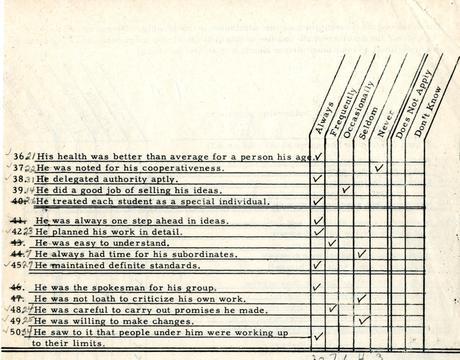
Boring closes the checklist with a footnote, in much the same way he footnotes many of his responses to this questionnaire. And I’ll close with this transcription of E. G. Boring’s checklist summary where he compares his academic influencer to Jehovah and describes feeling relief upon his death. Oof.
“Whew! Good Lord! To reduce EBTitchener to check marks! How insulted he would have been, he who regarded any questionnaire as an insult and invasion of his privacy!
Checking col.1 is humorous, because so many of the checks are understatements. Was Titchener self-assured? Was Jehovah? Did he make others enthusiastic? Would he tolerate anyone under him being less that [sic] maniacally enthsuastic [sic]?
Titchener dominated us all, yet I could not answer items 26-27 [edit], p.3. His insistence on the correctness of his knowledge as to the proper conduct of the details of the lives of his graduate students and the fact that he was so seldom demonstrably wrong created ambivalent responses. More of his good students broke bitterly with him than remained loyal. I remained loyal, yet held my dissents rigidly, insisting on doing many professional things of which Titchener disapproved. You could say he was my chief stimulator, yet his death left me with a great sense of freedom (like John Mill when James Mill died in 1837) and all my effective productive productivity has been since this release came to me.”
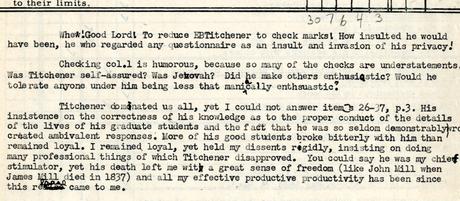
And a shout out to my mentor, Dr. Brian C. O’Connor, who sealed my academic fate the day he dropped a copy of his mentor’s book on my desk in grad school, Patrick Wilson‘s Public Knowledge Private Ignorance.
